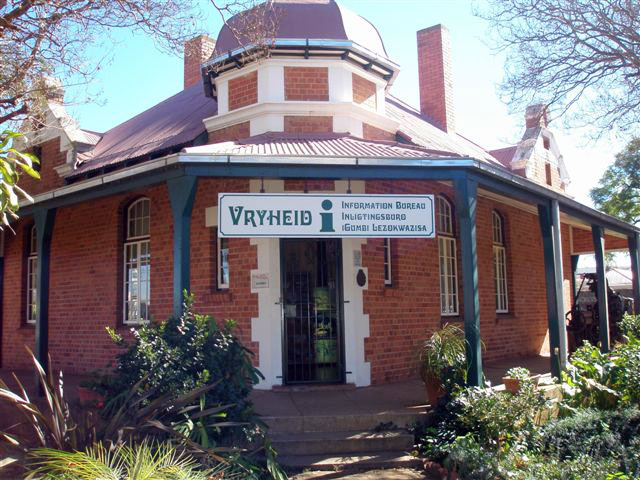Local Attractions...
Vryheid was founded in 1884 when Voortrekker settlers were granted a large area of land by the Zulu King Dinizulu. The Voortrekkers proclaimed the land as the Nieuwe Republiek, with Vryheid as its capital and Lucas Meijer as its president. The republic’s parliament building, the raadsaal, and the town jail are well preserved relics of that time. Lucas Meijer’s home is now a museum.
The town is the largest in the Zululand District. Tours are offered by Wilfred Mchunu and Eyethu Luxury Coaches, Rhoda: 073 210 1100.
For more information contact the Vryheid Information Bureau:
Tel: 034 982 2133 x 2271 • Fax: 034 982 3497
E-
Vryheid Hill Nature Reserve
The Vryheid Hill Nature Reserve is on the edge of town and offers excellent bird watching opportunities in a beautiful conservation area. The reserve includes glasslands, rocky slopes, forests and mixed woodland and is able to support a wide variety of animals, birds and plant species.
Animal life in the reserve includes grey duiker, mountain reedbuck, oribi, eland, Burchell’s zebra and blesbok. Pride of place in the reserve goes to a pair of crowned eagles who nest in the Cape ash tree in the forest overlooking the town. The reserve also includes the Ntingonono Eco Centre. Ntingonono focuses on environmental eductation for school groups and can seat 100 people in the main hall.
Many private land owners offer hunting and game viewing with accommodation ranging from rustic to very upmarket. Vryheid has grown as a conference and event centre and delegates can combine their Safari experience with a visit to one of the natural mineral spa resorts in the area.
Hunting & game viewing
Many private land owners offer hunting and game viewing with accommodation ranging from rustic to very upmarket. Vryheid has grown as a conference and event centre and delegates can combine their Safari experience with a visit to one of the natural mineral spa resorts in the area.
North - Where eagles soar
Hlobane Mountain was used by the Zulus as a fortress during their war against the British. It was here that Lieut-Colonel Redvers Buller won his Victoria Cross when rescuing a group of his mounted men who had been ambushed. Buller later became famous as a general during the Anglo-Boer War. Hlobane’s rich coal seams have been mined for more than 100 years.
The Vryheid Hill Nature Reserve is on the edge of town and offers excellent bird watching opportunities in a beautiful conservation area. The reserve includes glasslands, rocky slopes, forests and mixed woodland and is able to support a wide variety of animals, birds and plant species.
Animal life in the reserve includes grey duiker, mountain reedbuck, oribi, eland, Burchell’s zebra and blesbok. Pride of place in the reserve goes to a pair of crowned eagles who nest in the Cape ash tree in the forest overlooking the town. The reserve also includes the Ntingonono Eco Centre. Ntingonono focuses on environmental eductation for school groups and can seat 100 people in the main hall.
Many private land owners offer hunting and game viewing with accommodation ranging from rustic to very upmarket. Vryheid has grown as a conference and event centre and delegates can combine their Safari experience with a visit to one of the natural mineral spa resorts in the area.
South - Cradle of proud people
Just 2km south-west of the town on the Babanango road is the Klipfontein Bird Sanctuary, which includes a large wetland and provides a safe refuge for many rare and secretive wild waterbirds.
The sanctuary has a small hide overlooking a pan, allowing a great view of 10 duck species, African Rail, Red-chested Flufftail, and Black and Baillon’s Crakes. The pan’s reedbeds also attract a number of warbler, weaver, widowbird and whydah species. Pairs of Grey Crowned Crane and African Fish Eagle also breed in the sanctuary.
Another area popular with birdwatchers is Mpofini Mountain, 5km south-east of the town, where Verreaux’s Eagle, the Mocking Cliff-chat and Shelley’s Francolin are among the 200 species recorded.
East - The magnificence of nature
To the east are two special nature / wildlife areas; Ngome Forest and Ntendeka Wilderness and Ithala Game Reserve. The reserve is linked to the town by a good tarred road and also has a landing strip.
Ithala’s main camp is at Ntshondwe and there are secluded bush lodges, camping facilities and a luxurious lodge that sleeps six. The camp’s fully-equipped conference centre can seat up to 90 people. Ithala has four of the Big Five animals: elephant, rhino – both black and white – buffalo and leopard. It also has many species of antelope, including the only tsessebe in KwaZulu-Natal. Ithala has 315 species of bird.
West - Where guns fell silent
30km from town, is the Blood River Vlei with its 5000ha of wetland, known for its many and diverse waterbirds. Nearby is the Ncome Blood River heritage site where a major confrontation took place between the Voortrekkers and amaZulu on 16 December 1838. One really experiences both sides of this historic battle.

Based on reviews of establishments, Villa Beryl Guesthouse has been voted Best Establishment in Vryheid for 2016.







